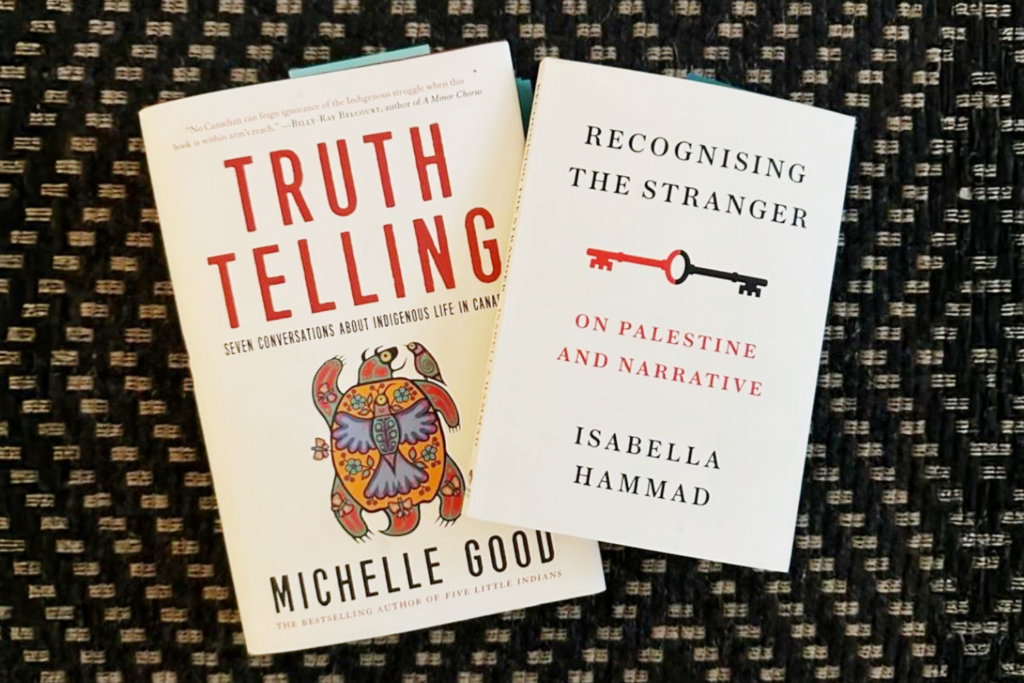Two books, this week, have kept me sane.
One is Michelle Good’s collection of seven essays about Indigenous life in Canada aptly titled ‘Truth Telling,’ and the other is Isabella Hammad’s ‘Recognizing the Stranger.’
Unsurprisingly the truth telling work of Indigenous writers such as Michelle Good would sit side by side with that of Palestinian writers such as Isabella Hammad. Both struggles mirror the brutalities of a settler colonial state built on racism and exploitation. And both speak to a deep and unshrinkable resistance to live wholly and willfully.
Michelle Good’s Truth Telling should be taught in schools across Turtle Island, I hope it will be. With historical research, personal narrative and oral histories in Indigenous tradition of sharing knowledge, she eviscerates the fantasy of the benevolent settler that Canada propagates as its national story. Her essays are anchored in truths about residential schools, treaties made with no intentions of honoring, and policies strategically aimed at dehumanizing, starving and economically choking a population into submission. In Good’s essays the truth about painfully predictable colonial tactics sits alongside resourceful and relentless acts of resistance, both of which continue today. If her essay ‘$13.69’ brings you to rightful rage, ‘The Rise and Resistance of Indigenous Literature’ will bring you to rightful hope, and ‘Land Back,’ charts a necessary path forward.
“Indigenous writers do this critical work of telling the truth and deepening understanding in beautiful, creative expression without becoming either didactic or dull. There is a trickster-like beauty in that, and we are all standing on the shoulders of the Indigenous women and men who broke down the doors and made room for these necessary works.”
My second read this week, Isabella Hammad’s ‘Recognizing the Stranger,’ was probably the best writing I could have read while witnessing the IOF’s brutality defy our notion of brutality itself. Recognizing the Stranger is a published address she delivered in September 2023 as part of the Edward Said Memorial Lecture at Columbia University. Reading this today, a year later as Columbia’s shameful suppression of intellectual thought and activism for human life continues undeterred, I’m reminded of the internet’s wise proclamation that ‘Columbia never deserved Said.’
Hammad’s brilliant address is an examination of narrative, particularly the questions that novels raise in us, their power in shaping our world view, bringing us to ourselves, to confront what is known, what is not, and how we might be wrong. In the context of Palestine she talks about people coming to the truth of Palestine, through narrative, though witness, while simultaneously being ‘paternalized’ by a zionist framing where “Individual moments of recognition are repeatedly overwhelmed by the energy of a political establishment that tells the onlooker: this is not what it looks like. It is too complicated to understand. Look away.” She talks about the energy and efforts of claiming and reclaiming the narrative, “the pressure is again on Palestinians to tell the human story that will educate and enlighten others and so allow for the conversion of the repentant Westerner.” But then she offers a far more freeing alternative to this need to show, to convince the unconvinced, she asks,
“Can we focus instead on our own networks, on thinking together, on resisting together, on supporting one another – openly?… I like this idea of breaking into the awareness of other people by talking candidly amongst ourselves.”
To me, this is the question and the action that poses the greatest hope. To refuse to waste our energy catering to a gaze whose starting point is our deficit. Instead to focus on each other with solidarity, care, criticality and love, as Angela Davis says, “It is in collectivities that we find reservoirs of hope and optimism.” I’m trying to channel rage into collection action, whoever comes along, come along.


